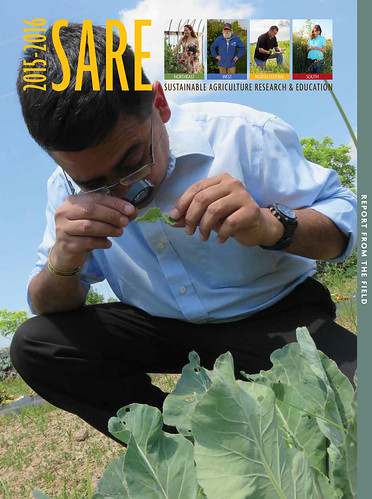Alabama Extension recognized nationally for helping organic producers with insect control
Article body
Insects are a significant problem for Alabama's conventional fruit and vegetable growers, but for the state's organic producers, they are a huge problem. Organic growers have a strong ally in the Alabama Cooperative Extension System. A team led by Ayanava Majumdar, an Extension entomologist, has used grants from the Sustainable Agriculture and Education, or SARE, program to identify new tools for Alabama growers to battle insects that can wipe out a crop.
Since it launched in 2012, Alabama Extension's organic Integrated Pest Management Program, or IPM, has reached almost 1,000 producers and helped them protect crops worth an estimated $2 million statewide. Surveys show that Alabama vegetable growers who follow organic IPM recommendations can reduce their crop losses by 40 to 50 percent, significantly boosting productivity with fewer pesticides.
The program's success was recently featured as the cover story in SARE's national biennial report. Read the story by visiting http://www.aces.edu/go/637.
"The adoption rate by farmers of Extension's organic IPM program speaks volumes about the quality of the program," said Gary Lemme, Alabama Extension director. "The recognition by SARE of Dr. Majumdar and the entire team's work is well deserved."
In 2014, the average IPM adoption rate for insect pest control was about 70 percent among all fruit and vegetable growers. The use of IPM strategies by more than 500 farms saved growers from direct crop losses of 50 percent or more. Producer training and direct consultation activities resulted in average increased profits of $439 per acre, which is equivalent to $4.9 million direct impact statewide. Simply put for every $1 invested by the state, Alabama Extension's IPM efforts gave a return on investment of about $59.
Paul Patterson, dean of Auburn University's College of Agriculture, said the team's work is making a difference for the state's farmers.
"We are proud of Dr. Majumdar and his team for the ways they are advancing the work of growers throughout this state and region," he said. "This is a reflection not only of how our teams at Auburn are reaching out to the communities around us. It is also a reflection of our research scientists in agriculture and the practical, sustainable solutions they are finding and developing for our producers every day."
College of Agriculture scientists and Extension professionals work together to find ways that research can be applied on farms in ways that are both effective and cost efficient for the state's farmers.
Physical pest exclusion is just one example of new pest management options that Majumdar and the Extension team are introducing to farmers. Typically accomplished by growing crops inside structures covered with a shade cloth akin to mosquito netting, the strategy has shown great promise. On one Baldwin County farm where it was tested thanks to a SARE farmer grant, a tomato crop grown inside protected structures suffered losses of less than 20 percent. In contract, a tomato crop grown in an open field was lost almost totally to insect pests.
Majumdar estimates that producers could expect to spend $250 to $420 to outfit an existing high tunnel with shade cloth, depending on the mesh size.
"We have found producers recover the shade cloth costs in the reduced cost of pesticides and labor to manage insect pests," he said.
Learn more about the Alabama SARE program at http://www.aces.edu/go/638 and Alabama Extension's new Beginning Farmer effort at http://www.aces.edu/anr/beginningfarms/.
Related Media
Media interested in this story can contact Communications Director Preston Sparks at (334) 844-9999 or preston.sparks@auburn.edu.
Auburn University is a nationally ranked land grant institution recognized for its commitment to world-class scholarship, interdisciplinary research with an elite, top-tier Carnegie R1 classification, life-changing outreach with Carnegie’s Community Engagement designation and an undergraduate education experience second to none. Auburn is home to more than 30,000 students, and its faculty and research partners collaborate to develop and deliver meaningful scholarship, science and technology-based advancements that meet pressing regional, national and global needs. Auburn’s commitment to active student engagement, professional success and public/private partnership drives a growing reputation for outreach and extension that delivers broad economic, health and societal impact.





